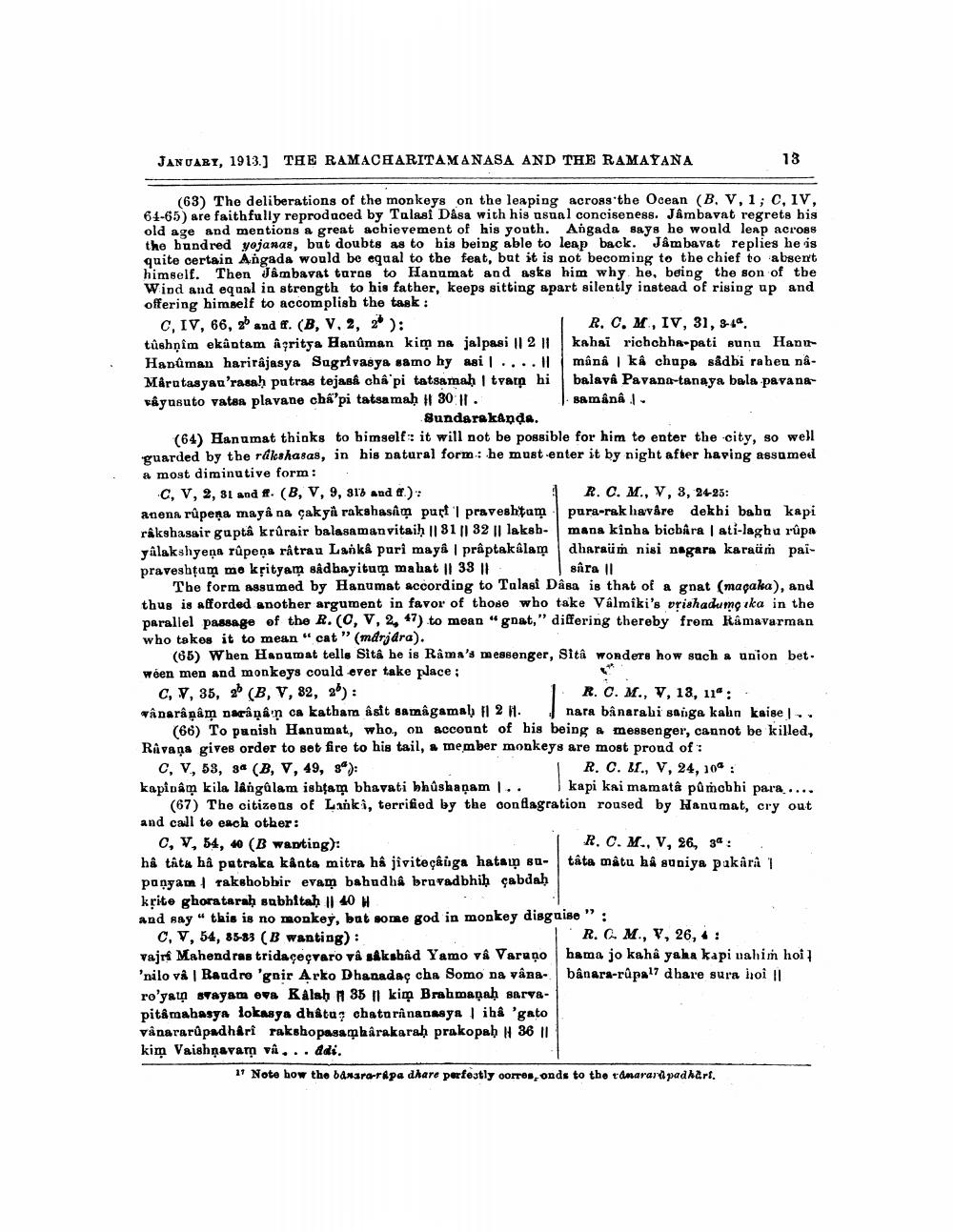________________
JANUARY, 1913.) THE RAMACHARITAMANASA AND THE RAMAYANA
13
(63) The deliberations of the monkeys on the leaping across the Ocean (B, V, 1; C, IV, 64-65) are faithfully reproduced by Talasi Dasa with his usual conciseness. Jámbavat regrets his old age and mentions a great achievement of his youth. Angada says he would leap across the bundred yojanas, but doubts as to his being able to leap back. Jambavat replies he is quite certain Angada would be equal to the feat, but it is not becoming to the chief to absen't himself. Then Jambavat turns to Hanumat and asks him why he, being the son of tbe Wind and equal in strength to his father, keeps sitting apart silently instead of rising up and offering himself to accomplish the task : C, IV, 66, 7 and . (B, V.2, 2):
1 R. C.M., IV, 31, 3-44 tủshnim ekântam Agritya Hanuman kim na jalpasi 11 211 kahai richchha-pati bunu HanrHanûman harirâjasya Sagrivasya samo hy asi....!! mânâ kâ chupa sadbi rahen nâMårutasyau'rasah patras tejasa cha pi tatsamah 1 tvarp hi balaya Pavana-tanaya bala pavanavậyusuto vatsa plavane chá'pi tatsamah # 30 .
samânâ .
Sundarakanda. (64) Hanumat thinks to himself: it will not be possible for him to enter the city, so well guarded by the rakshasas, in his natural form: he must enter it by night after having assumed a most diminutive form: . C, V, 2, 31 and ff. (B, V, 9, 91% and !):
R. C.M., V, 3, 24-25: anena rûpeņa maya na çakya rakshasim purt praveshtam pura-rak havare dekhi baba kapi rakshasair guptâ krůrair balasamanvitaih 11 81 || 32 || laksb-mana kinha bicbara | ati-laghu rupa yalakshyeņa rupeņa râtrau Lankâ puri maya prâptakûlam dharau nisi nagara karaüm paipraveshtam mo krityam Badhayitum mahat 11 33 11.
sîra 11 The form assumed by Hanumat according to Talasi Dâga is that of a gnat (macaka), and thug is afforded another argument in favor of those who take Valmiki's vrishadumg ika in the parallel passage of the R. (C, V, 2, 47) to mean "gnat," differing thereby from Kamavarman who takes it to mean "cat" (mdrjdra).
(65) When Hapumat tells Sitä he is Rama's messenger, Sita wonders how such a union bet. woen men and monkeys could ever take pace; C, V, 35, 28 (B, V, 82, 2):
1 R. C.M., V, 13, 11* :wânarânâm daraa n ca katham âsit samagamal # 2 1. nara banarahi sanga kahn kaise ..
(66) To panish Hanumat, who, on account of his being & messenger, cannot be killed, Ravana gives order to set fire to his tail, a member monkeys are most proud of: C, V, 53, 3a (B, V, 49, 39):
1 R. C. II., V, 24, 10": kapidâm kila långalam ishtam bhavati bhushanam .. kapi kai mamatâ pû mcbhi para ...,
(67) The citizens of Lanki, terrified by the conflagration roused by Hanumat, cry out and call to each other: C, V, 54, 40 (B wanting):
R. C.M., V, 26, 34 : hê tîta ha patraka kanta mitra ha jiviteçkinga hatau 80- tâta mátu há suniya pakara 1 panyam rakehobbir evam bahudhå bruvadbhih çabdah krite ghora tarah sabhitah || 40 W and say " this is no monkey, bat some god in monkey disguise" : C, V, 54, 85-83 (B wanting):
R.O.M., V, 26, 4: vajrf Mahendras trida çeçvaro và sákshad Yamo va Varuņo hama jo kaha yaha kapi vahim hoit 'nilo vå| Randro 'goir Arko Dhanadac cha Somo na vâna bânars-rupa17 dbare sura loi || ro'yai svayam ova Ralah 35 1 kim Brahmanah sarvapitämahasya lokasya dhatu, chata rînapasya | ihå 'gato vånararapadhari rakshopasamhârakarah prakopah H 36 II kim Vaishṇavam vi... adi.
11 Note how the banararapa dhare perfestly corres, onds to the ramararipadhari.




